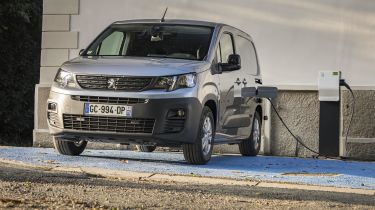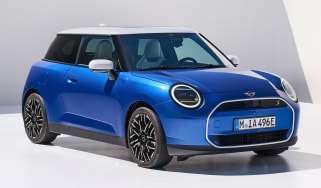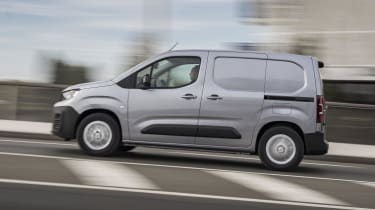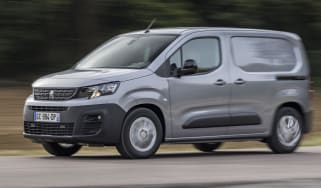New 2021 Peugeot e-Partner electric van: prices, specs, details and pictures
The new Peugeot e-Partner electric van is a sister model to the Citroen e-Berlingo and Vauxhall Combo-e; it's on sale now, priced from

The fully electric version of Peugeot's smallest van, the e-Partner, is on sale now and priced from £27,910 before VAT, but including the government's plug-in van grant. The e-Partner is one of a trio of compact electric vans from Stellantis Group brands, which also includes the Citroen e-Berlingo and Vauxhall Combo-e. The group hopes to offer a fully electrified range by 2025, but these models ensure that milestone will be reached for its light-commercial-vehicle line-up by the end of 2021.
Official performance figures for the e-Partner are 0-62mph in 11.2 seconds and a top speed just exceeding 80mph. Three driving modes are available, with Power offering the highest power output, Normal limiting the van to 107bhp for a balance of power and range and Eco pegging it back to 80bhp in order to maximise range. The strength of the regenerative braking system can also be adjusted to the driver's preference.
Sitting at the entry point to Peugeot's electric van range, below the mid-size e-Expert and large e-Boxer, the e-Partner shares technology with other small electric models from Stellantis Group brands, including the Vauxhall Corsa-e and Peugeot e-208 superminis, as well as the Vauxhall Mokka-e, Peugeot e-2008 and DS 3 Crossback E-TENSE SUVs. That means a 50kWh battery size for an expected maximum driving range of 170 miles, along with a 134bhp electric motor.
As standard, the e-Partner has a 7.4kW on-board charger, but this is upgradeable to 11kW (suitable for use with three-phase electricity supplies) as an option. A full charge from a standard domestic socket will take 15 hours, while a 7.4kW wallbox will take seven-and-a-half hours to do the same. Using a three-phase 11kW wallbox cuts the time further to five hours, while rapid charging from a 100kW public point can deliver an 80% top-up in 30 minutes.
Two body lengths are being offered – the 4.4-metre 'Standard' and the 4.75-metre 'Long' – as well as three-seat panel van and five-seat crew van configurations. Maximum towing capacity is 750kg and maximum payload is up to 800kg. The load volumes of up to 4.4 cubic metres (in the Long) and up to 3.8 cubic metres (in the Standard) is identical to those of the equivalent diesel-engined Partners. Up front, a 10-inch digital touchscreen can be fitted as an option.
The e-Partner is available in Professional Premium and Asphalt Premium trims from launch. The panel-van configurations are available with both trims, while the crew van is sold exclusively in Professional Premium spec, priced at £30,260. The latter trim level features a modular folding passenger bench seat, which helps improve load capacity, as well as a pivoting writing table and a load-through bulkhead. Drivers also get an alarm, air-conditioning and cruise control with a variable speed limiter, as well as an eight-inch touchscreen with Apple CarPlay and Android Auto.
Asphalt Premium (priced at £29,525) comes with 16-inch alloy wheels, body-coloured rear bumper and side rubbing strips, as well as automatic windscreen wipers. Inside, the cabin features additional acoustic insulation for improved refinement, along with sat nav and a 10-inch digital instrument screen. Front and rear parking sensors plus side and rear cameras are also included to help when reversing.

As with the Citroen e-Berlingo, the Peugeot e-Partner is a long-overdue replacement for a dated outgoing model that went off sale in 2019. This was based on an ageing platform and had a real-world range of only 70 miles or so; the latest-generation model is a big step forward. As well as competing directly with its Stellantis Group relatives, the e-Partner rivals the second-generation Renault Kangoo E-TECH and the LEVC VN5.
Recommended
Most Popular

Morgan Super3 XP-1 is an electric three-wheeler

MINI Cooper Electric: pricing and specs for British-built electric supermini


